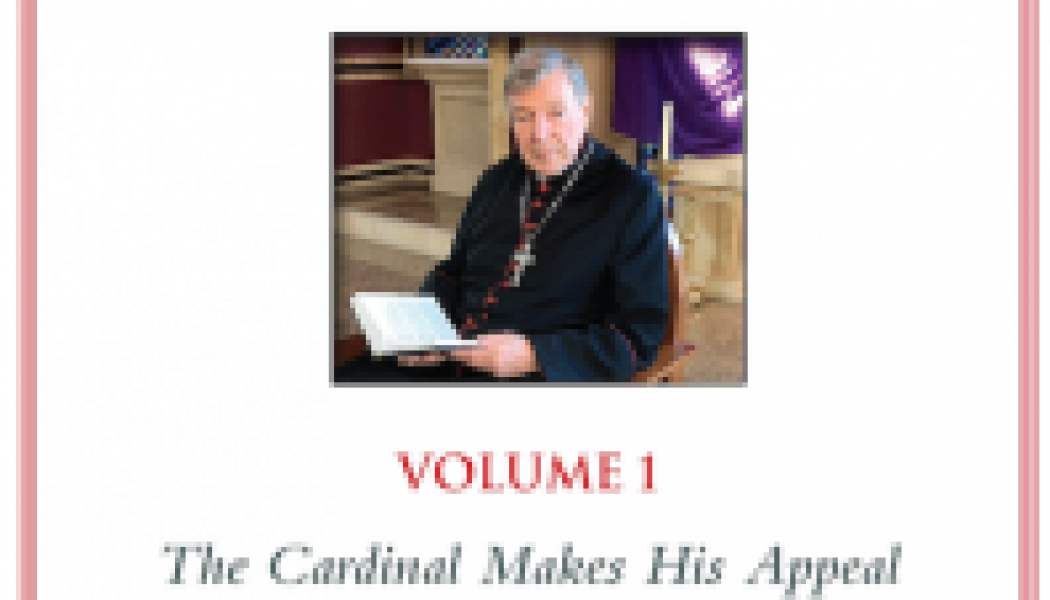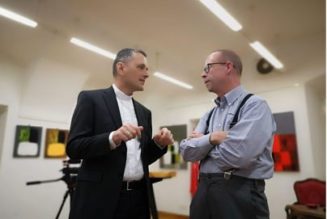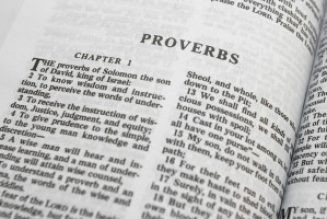
> Italiano
> English
> Español
> Français
> All the articles of Settimo Cielo in English
*
Set free on April 7 by the High Court of Australia, which unanimously judged the accusations as baseless, Cardinal George Pell, 79, sent off his prison journal for publication by Ignatius Press, the American publishing house founded and directed by the Jesuit Joseph Fessio, a veteran disciple of Joseph Ratzinger and member of his “Schulerkreis.”
And now his wish is coming true. The first volume of Pell’s “Prison Journal” will be released on December 15, and Settimo Cielo is previewing some of the passages here, with the permission of the publisher.
The 350-page book covers the first five months of the 404 days the cardinal spent in solitary confinement in the Melbourne Assessment Prison.
Each evening Pell wrote a diary entry for the day,
two or three pages that almost always began with his reflections on the two morning readings of the breviary, one from the Bible and another from the Fathers of the Church, and ended with a prayer.
The Bible and the breviary – with Lauds, Vespers, and the office of readings – were two of the six books, no more, that he was allowed to select and keep with him in prison. Another was Leo Tolstoy’s “War and Peace.”
The cell was roughly 7 feet by 24, with the bed, the chair, the table, the sink, the toilet, the shower, the television. The window, with bars and tinted glass, always remained closed. The same cell block housed murderers and terrorists, some of them Muslims, and Pell could hear both their prayers and their shouting. Twice a day he was allowed to go out for half an hour into a small courtyard surrounded by high walls, there too all alone, and this was also the only time he could telephone. A couple of times a week he received visitors and from time to time a nun brought him Eucharistic communion.
He was not allowed to celebrate Mass, and watched Sunday Mass on television. He received many letters, including from some of the neighboring prisoners, and his family and friends provided him with newspapers, clippings, printed web pages, including those of Settimo Cielo. He wore the same uniform as the other inmates, without a belt for safety reasons, and was subjected, like the others, to frequent drug tests and body inspections.
Yet his diary entries have nothing dark about them. Instead they are calm and soothing, with a touch of irony here and there. The Australian football and rugby matches find a wholehearted commentator in him. The writing is both simple and profound. There’s no complaining. Even when criticisms of Francis and Benedict XVI emerge, they are measured and unbiased, as can be seen in the passages below.
On the financial scandal in the curia, which had also tormented him so much in Rome, there is even less in the journal than the very little that Pell said a few days ago in the interview with Nicole Winfield for the Associated Press; that is, yes, he had never thought that “it would be as Technicolor as it proved,” but “it just might be staggering incompetence,” unfortunately with “so much criminality involved,” and as to the possible Vatican contribution to the campaign against him in Australia his hope is that there was none, “but I think we will find out, whether there is or there isn’t,” because “certainly the party’s not over.”
But now let’s hear from Cardinal Pell, in this little anthology of his “Prison Journal.”
*
JOB’S SUFFERING, MINE, AND THAT OF MY CHINESE FRIENDS
(Monday March 4 and Saturday June 15 2019, pp. 26-27 and 283-284)
In the breviary, Job’s problems continued and worsened, as Satan was allowed to infect him with malignant ulcers. Job didn’t condemn God, although his embittered wife urged him to “curse God and die.” Job uttered no sinful word. “If we take happiness from God’s hand, must we not take sorrow too?” ( Job 2:9-10).
On many occasions, when I was asked about undeserved suffering, I used to reply that “God’s Son, Jesus, didn’t get a very good run.” For Christians, this always causes them to pause and consider, and I sometimes asked them also to recall their blessings. […]
I didn’t like writers, even great Christian writers such as St John of the Cross, who emphasized the essential and necessary role of suffering if we want to come closer to God. I never read much of his work, finding it a bit frightening, while I did manage to finish “The Interior Castle” [1588] by St Teresa of Avila, who followed a similar robust Spanish theology.
My approach is more like Jude Chen’s grandfather, […] who prayed to God for small troubles, because without them he would become proud, and through them he wanted to avoid big trouble. […]
My time in jail is no picnic, but it pales into holiday time when compared with some other jail experiences. My good friend Jude Chen, originally from Shanghai and now living in Canada, wrote [me] of his family’s imprisonment under the Chinese Communists.
In 1958, Jude’s brother, Paul, a seminarian, and sister, Sophie, at high school, were jailed for their Catholicism, and spent thirty years in two different jails, Sophie’s being in the cold of northern China. The family was allowed a monthly fifteen-minute visit when they were in a Shanghai jail and a letter of a hundred words per month for the three decades.
Jude’s grandfather Simon, who had been a wealthy man, building a parish church dedicated to the Holy Trinity, had all his property confiscated. Jude loved him, and they lived in the same house for nine years until the old man died. Jude recounts that when asked about his confiscated property, he replied, “Everything was from God and shall be returned to God.”
After the Cultural Revolution began in the spring of 1966, the Red Guards raided their house and were disappointed to find Grandfather Simon dead. So, they destroyed his grave, ransacked the house, forcing Jude’s mother to burn all their religious objects. Jude’s father was sacked as a teacher, reduced to janitor.
Aged eleven and in primary school, Jude was forced to confess to his forty classmates that he was a criminal from a criminal family. He can still remember his teacher telling his fellow students to give him a wide berth.
At seventeen years of age, Jude himself was sent to a labour camp for eight years in a Shanghai suburb. As he was leaving, his parents instructed him, “Jude, keep no hatred in your heart but only love.” This is the holy fuel which powers the Church.
*
THOSE INTERPRETATIONS OF “AMORIS LAETITIA” THAT ARE SO DANGEROUS
(March 3, Ash Wednesday, and Saturday March 23 2019, pp. 25 and 75)
[I’m] still following through with Hebrews, a great piece, which develops Paul’s central task of explaining Jesus’ role in Old Testament or Jewish categories; that he completes the work and message of the first Covenant. Fidelity to Christ and his teaching remains indispensable for any fruitful Catholicism, any religious revival. This is why the “approved” Argentinian and Maltese interpretations of “Amoris Laetitia” are so dangerous. They go against the teaching of the Lord on adultery and the teachings of St Paul on the necessary dispositions to receive Holy Communion properly. […]
The first breviary reading is again from Exodus and relates the promulgation by God of what we have tidied up into the Ten Commandments (Exodus, chap. 20). As an adult, and even as a child, I always regarded them as essential. Fifty years ago, I remember reading that Bertrand Russell, a famous atheist philosopher, claimed the Ten Commandments were like a final exam of ten questions, where only six needed to be attempted. Clever, but too convenient. […]
At the two Synods on the Family, some voices loudly proclaimed that the Church was a hospital or a port of refuge. This is only one image of the Church and far from the most useful or important, because the Church has to show how not to become sick, how to avoid shipwrecks, and here the commandments are essential. Jesus himself taught, “If you keep my commandments you will remain in my love” ( Jn 15:10).
(An editorial footnote concerning the interpretations of “Amoris laetitia” explains that “pastoral guidelines” that “permitted divorced and remarried Catholics to receive Communion under certain circumstances” were published in Argentina and Malta, and “Pope Francis endorsed the Buenos Aires guidelines in a letter to the bishops of the region in September 2016,” while “the publication of the Maltese guidelines in ‘L’Osservatore Romano,’ the newspaper of the Holy See, in January 2017 was seen by some as an official endorsement of these guidelines as well.”)
*
“POPE EMERITUS”? A ROLE TO BE REDEFINED
(Saturday June 29 2019, Feast of Saints Peter and Paul, p. 319)
I favour the millennial tradition that the popes do not resign, that they continue until their death, because this helps maintain the unity of the Church. Improvements in modern medicine have complicated the situation, ensuring that the popes of today and tomorrow are likely to live longer than their predecessors, even when their health has been much weakened. […]
However, the protocols on the situation of a pope who has resigned need to be clarified, to strengthen the forces for unity. While the retired pope could retain the title of “pope emeritus”, he should be renominated to the College of Cardinals so that he is known as “Cardinal X, Pope Emeritus”, he should not wear the white papal soutane and should not teach publicly. Because of reverence and love for the pope, many will feel reluctant to impose such restrictions on someone who once held the See of Peter. Probably the measures would be best introduced by a pope who had no surviving predecessor.
*
A HANDWRITTEN CARD FROM MCCARRICK, “ONCE CARDINAL”
(Tuesday June 4 2019, p. 254)
I received yesterday, forwarded from Rome by my secretary there, Fr Anthony Robbie, a small card, covered with tiny illegible writing from Ted McCarrick. Despite repeated efforts, I could not read 80 or 90 percent of it, so that I could not even recognize his main message to me. He is eighty-nine years of age and signed himself “Ted McCarrick, Catholicus, olim cardinalis”, Latin for “Catholic, formerly a cardinal”.
He was always courteous toward me and was a gifted networker and fundraiser, well connected across the board and especially with the Democrats. Sadly, he caused a lot of harm in more ways than one. […] While I pray explicitly each day for the victims, I have not had a category on my prayer list for offending priests and delinquent bishops. I should remedy that, and I have prayed for Ted McCarrick, “olim cardinalis”.
*
THE MUSLIM WOMAN CONVERTED TO JESUS, “WHATEVER THE COST”
(Monday July 1 2019, p. 323)
One Australian priest informed me that he had just received six Muslims into the Catholic Church, baptising and confirming them, and that two had been ostracised by their family. He enquired of one why she was willing to take this step, and she replied simply that “she wanted to love Jesus, whatever the cost.” He himself then commented, “I suppose that for all of us that should be our only motive and goal.” These are part of a steady subterranean stream of Muslim converts.
*
THE CASE OF THE RUGBY PLAYER FOLAU, WHEN EVEN GOD IS LOST IN THE FOG
(Monday May 6 and Wednesday June 262019, pp. 181 and 309-311)
Israel Folau is a brilliant rugby union player, originally from Tonga and a devout man of simple Christian faith, an old type Protestant, who has no time for the Catholic feasts of Christmas and Easter, much less for devotion to Our Lady.
He paraphrased and changed St Paul’s list of those who will not “inherit the Kingdom of God”, posting his warning on Instagram: “Drunks, homosexuals, adulterers, liars, fornicators, thieves, atheists, idolaters. Hell awaits you. Repent.” Rugby union officials sacked him for hate speech. […]
This case will set important precedents in the struggle for religious freedom, and the Australian Christian Lobby has shown good judgement in backing Folau. While I am not in favour of condemning people to hell (this is God’s business), Folau is simply restating the teachings of the New Testament, listing activities not compatible with the membership of the Kingdom of heaven. What is strange is that there is no complaint from the idolators, adulterers, liars, fornicators, etc., protesting their exclusion. I wonder how many of those hostile to Folau are Christians and how may believe in heaven and hell. People who are secure in their beliefs are not too much concerned by the expression of different or opposing views, especially if they are regarded as nonsensical. The increasingly uncouth forces of political correctness are not satisfied that all persons are treated with respect and love, but are demanding in the name of tolerance, not only that homosexual activity be legal as well as same-sex marriages, but that everyone must approve these activities, at least publicly; and that everybody should be prevented from espousing Christian teachings on marriage and sexuality in any public forum. This would be the end of religious freedom. […]
We are entering a new world of ideas with the collapse of monotheism. […] Western civilization has made us what we are, and one reason for its achievements is the creative tension between Athens and Jerusalem. Both cities are under attack. Jerusalem and Rome, her ally, bear the brunt of this assault, the frontal assaults, but her weakness makes it hard to defend Athens. When God is lost in the fog, whether it is the fog of lust or of possessions or of power, the defences of reason and truth are breached.
.
Join Our Telegram Group : Salvation & Prosperity






